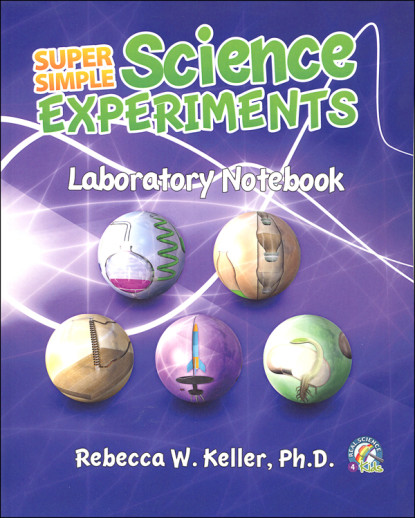We use cookies to make your experience better. To comply with the new e-Privacy directive, we need to ask for your consent to set the cookies. Learn more.
Super Simple Science Experiments Laboratory Notebook
Consumable Student Lab Notebook that can be used with any of the Super Simple Experiments (Astronomy, Biology, Chemistry, Geology, Physics, or the 101 books). Provides blank template for recording lab observations and drawings as well as graph paper and lined pages for notes.
Items listed in this section tend to be complete science programs with a teacher and student component, requiring few supplements besides science supplies.
Each 70-page student text is formatted similarly to a high-school text, with each chapter broken down into smaller segments on more specific topics. Although the text introduces concepts most children won't encounter in their elementary science curriculum, the explanations are clear and are presented in a way that they can understand. To give you an example of the types of topics covered, in Chemistry, chapters discuss matter, molecules, types of chemical reactions (including combination, decomposition and exchange reactions), acids, bases, neutralization, polymers, DNA, and more. Biology covers taxonomy, cells, photosynthesis, plants, protists, life cycles of the butterfly and frog, the water cycle, and more. Physics includes chapters on: force, work, potential and kinetic energy, motion, electrical energy and charges, electromagnetism, conservation of energy, and so on. Astronomy is the newest edition in this series and its 80+ pages include chapters on: What is astronomy, astronomer's toolbox (telescopes, Mars Rover, Hubble, etc.), earth, moon and sun, planets, solar system, other systems, our galaxy, other galaxies, and the universe. Each text contains ten chapters in all, split up into smaller segments on more specific sub-topics. Each segment focuses on one topic, and is short enough to read at one sitting without taxing short attention spans. The pages also incorporate colorful graphics and simple diagrams, and important words in the text areprinted in red. A summary wraps up each chapter, recapping the main points kids shouldtake from the reading, and a combined glossary index is included at the end of each book.
Dr. Rebecca Keller of Gravitas has compiled a selection of terrific, "super-simple" science experiments that can be used with any science curriculum. Super Simple Science Experiments breaks down the steps of scientific investigation and allow students to focus on one bite at a time. These experiments can be done with household items and help students develop skills needed for higher level science thinking. Each experiment is only one page in length and includes an objective, materials needed and an outline of the experiment. Other embellishments include a one-word description of the skill being developed (found in an upper corner of the page), illustrations if necessary, and the 'results and conclusions' for that particular experiment. A cumulative materials list is found at the front of each book and any pages or templates needed for the experiments are found at the back of the book and are reproducible for family use. Examples from the chemistry experiments book are identifying elements from the periodic table, testing for bases and acids, separating ink, polymers, making a DNA model, and osmosis. In astronomy children will be constructing models of the planets, sun and moon, finding the constellations and important stars, and more.
As of press time astronomy, biology, and chemistry are in print, but others in the series will follow. 101 Science Experiments will include some experiments from the other books in the series along with a few new ones.
The Super Simple Science Experiments Lab Notebook is also available and is referenced in many of the experiments. This notebook offers boxes for sketching and blank wide-ruled lines for writing as directed in the experiments. The laboratory notebook is not required. Students can use a notebook or notesketch pad (20178, 20179, 19930) which has room on each page for sketching and writing.
If you are looking to add more hands-on time to your science curriculum or you want to add more to your Gravitas curriculum, these books are a great option. The experiments included in these books overlap very little with the experiments found in the Gravitas curriculum therefore would serve as a good extension to the program. This series offers some good, simple hands-on alternatives. ~ Donna
| Product Format: | Softcover Book |
|---|---|
| Brand: | Gravitas Publications |
| Grades: | 4-6 |
| ISBN: | 9781953542038 |
| Length in Inches: | 10 |
| Width in Inches: | 8 |
| Height in Inches: | 0.375 |
| Weight in Pounds: | 0.7 |

